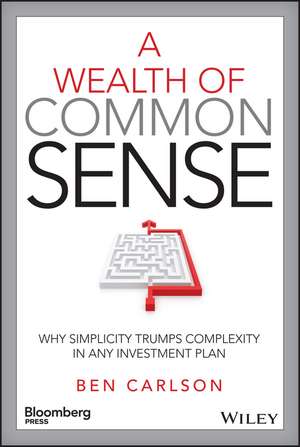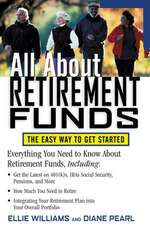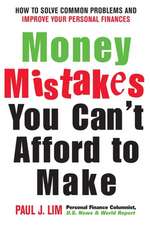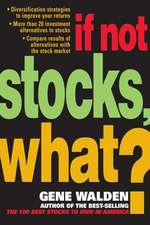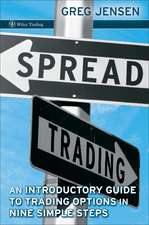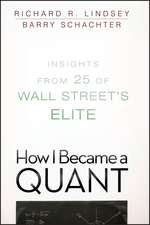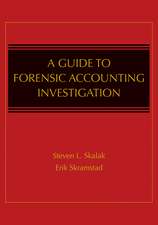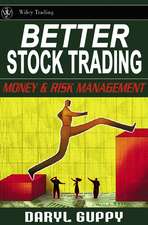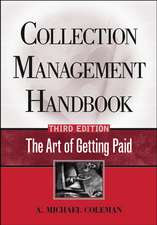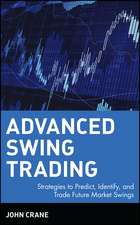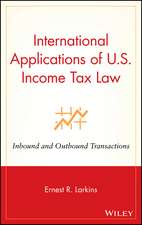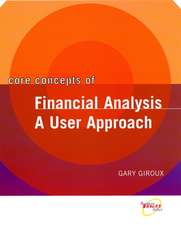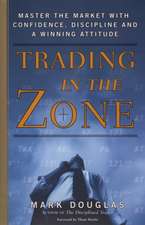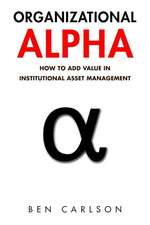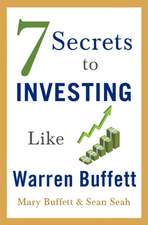A Wealth of Common Sense – Why Simplicity Trumps Complexity in Any Investment Plan: Bloomberg
Autor B Carlsonen Limba Engleză Hardback – 20 iul 2015
Complexity is often used as a mechanism for talking investors into unnecessary purchases, when all most need is a deeper understanding of conventional options. This book explains which issues you actually should pay attention to, and which ones are simply used for an illusion of intelligence and control.
- Keep up with or beat professional money managers
- Exploit stock market volatility to your utmost advantage
- Learn where advisors and consultants fit into smart strategy
- Build a portfolio that makes sense for your particular situation
Din seria Bloomberg
-
 Preț: 225.67 lei
Preț: 225.67 lei -
 Preț: 186.75 lei
Preț: 186.75 lei -
 Preț: 156.49 lei
Preț: 156.49 lei -
 Preț: 182.35 lei
Preț: 182.35 lei -
 Preț: 255.06 lei
Preț: 255.06 lei -
 Preț: 201.03 lei
Preț: 201.03 lei -
 Preț: 129.26 lei
Preț: 129.26 lei -
 Preț: 159.58 lei
Preț: 159.58 lei -
 Preț: 194.37 lei
Preț: 194.37 lei -
 Preț: 228.51 lei
Preț: 228.51 lei -
 Preț: 201.23 lei
Preț: 201.23 lei -
 Preț: 131.88 lei
Preț: 131.88 lei -
 Preț: 246.35 lei
Preț: 246.35 lei -
 Preț: 158.58 lei
Preț: 158.58 lei -
 Preț: 126.84 lei
Preț: 126.84 lei -
 Preț: 147.62 lei
Preț: 147.62 lei -
 Preț: 170.30 lei
Preț: 170.30 lei -
 Preț: 160.63 lei
Preț: 160.63 lei -
 Preț: 215.12 lei
Preț: 215.12 lei -
 Preț: 252.72 lei
Preț: 252.72 lei -
 Preț: 129.50 lei
Preț: 129.50 lei -
 Preț: 167.78 lei
Preț: 167.78 lei -
 Preț: 136.91 lei
Preț: 136.91 lei -
 Preț: 166.39 lei
Preț: 166.39 lei -
 Preț: 247.45 lei
Preț: 247.45 lei -
 Preț: 278.90 lei
Preț: 278.90 lei -
 Preț: 331.93 lei
Preț: 331.93 lei -
 Preț: 99.17 lei
Preț: 99.17 lei -
 Preț: 127.63 lei
Preț: 127.63 lei -
 Preț: 196.63 lei
Preț: 196.63 lei -
 Preț: 184.13 lei
Preț: 184.13 lei - 8%
 Preț: 434.28 lei
Preț: 434.28 lei -
 Preț: 292.55 lei
Preț: 292.55 lei -
 Preț: 221.55 lei
Preț: 221.55 lei - 30%
 Preț: 327.10 lei
Preț: 327.10 lei -
 Preț: 120.66 lei
Preț: 120.66 lei -
 Preț: 133.85 lei
Preț: 133.85 lei -
 Preț: 123.33 lei
Preț: 123.33 lei - 8%
 Preț: 202.07 lei
Preț: 202.07 lei -
 Preț: 81.88 lei
Preț: 81.88 lei - 5%
 Preț: 196.26 lei
Preț: 196.26 lei -
 Preț: 119.45 lei
Preț: 119.45 lei -
 Preț: 81.41 lei
Preț: 81.41 lei -
 Preț: 96.16 lei
Preț: 96.16 lei -
 Preț: 83.48 lei
Preț: 83.48 lei -
 Preț: 138.90 lei
Preț: 138.90 lei -
 Preț: 134.91 lei
Preț: 134.91 lei -
 Preț: 150.24 lei
Preț: 150.24 lei - 11%
 Preț: 161.36 lei
Preț: 161.36 lei
Preț: 231.58 lei
Nou
44.31€ • 46.27$ • 36.67£
Carte disponibilă
Livrare economică 14-28 martie
Livrare express 27 februarie-05 martie pentru 33.16 lei
Specificații
Public țintă
Sophisticated individual investors, financial advisors and investment consultants.Descriere
PRAISE FOR
A WEALTH OF COMMON SENSE
"The content of this book lives up to the title. Ben Carlson has mastered the art of exposing the few big topics that matter most to investors, leaving out the complicated but often unnecessary topics found in other investment books. Any investor, from a beginner to a professional, can learn a tremendous amount from A Wealth of Common Sense."
Morgan Housel, columnist for The Motley Fool and the Wall Street Journal
"Through hard work Ben Carlson has rapidly established himself as one of the nation′s premier investment bloggers. In his new book, A Wealth of Common Sense, Carlson cements his position as a prudent and practical voice for the individual investor."
Tadas Viskanta, founder and editor of Abnormal Returns and author of Abnormal Returns: Winning Strategies from the Frontlines of the Investment Blogosphere
"Ben Carlson seemingly came out of nowhere and took the financial commentariat by storm with his straightforward, insightful blog posts. True investing wisdom born out of experience and success cannot be faked; it must be earned. This is precisely the type of wisdom that comes oozing out of every chapter in A Wealth Of Common Sense."
Downtown Josh Brown, author of the bestselling book Backstage Wall Street and The Reformed Broker blog, star of CNBC′s The Halftime Report,
YOUR NO–NONSENSE GUIDE TO COMMON SENSE INVESTING
Cut through the confusion and noise and focus on what actually matters. A Wealth of Common Sense clears the air and gives you the insight you need to become a smarter, more successful investor.
Complexity is often used as a mechanism for talking investors into unnecessary purchases, when all most need is a deeper understanding of conventional options. This book explains which issues are important and which are not.
Take a look inside for guidance on how to:
- Keep up with or beat professional money managers
- Exploit stock market volatility to your utmost advantage
- Learn where advisors and consultants fit into a smart strategy
- Build a portfolio that makes sense for your particular situation
Textul de pe ultima copertă
PRAISE FOR
A WEALTH OF COMMON SENSE
"The content of this book lives up to the title. Ben Carlson has mastered the art of exposing the few big topics that matter most to investors, leaving out the complicated but often unnecessary topics found in other investment books. Any investor, from a beginner to a professional, can learn a tremendous amount from A Wealth of Common Sense."
Morgan Housel, columnist for The Motley Fool and the Wall Street Journal
"Through hard work Ben Carlson has rapidly established himself as one of the nation′s premier investment bloggers. In his new book, A Wealth of Common Sense, Carlson cements his position as a prudent and practical voice for the individual investor."
Tadas Viskanta, founder and editor of Abnormal Returns and author of Abnormal Returns: Winning Strategies from the Frontlines of the Investment Blogosphere
"Ben Carlson seemingly came out of nowhere and took the financial commentariat by storm with his straightforward, insightful blog posts. True investing wisdom born out of experience and success cannot be faked; it must be earned. This is precisely the type of wisdom that comes oozing out of every chapter in A Wealth Of Common Sense."
Downtown Josh Brown, author of the bestselling book Backstage Wall Street and The Reformed Broker blog, star of CNBC′s The Halftime Report,
YOUR NO–NONSENSE GUIDE TO COMMON SENSE INVESTING
Cut through the confusion and noise and focus on what actually matters. A Wealth of Common Sense clears the air and gives you the insight you need to become a smarter, more successful investor.
Complexity is often used as a mechanism for talking investors into unnecessary purchases, when all most need is a deeper understanding of conventional options. This book explains which issues are important and which are not.
Take a look inside for guidance on how to:
- Keep up with or beat professional money managers
- Exploit stock market volatility to your utmost advantage
- Learn where advisors and consultants fit into a smart strategy
- Build a portfolio that makes sense for your particular situation
Cuprins
Introduction: Why Simplicity Is the New Sophistication xi Chapter 1 The Individual Investor versus the Institutional Investor 1
Institutional versus Individual Investors 5
We re All Human 9
Extra Zeroes 12
Long–Term Thinking 13
Key Takeaways from Chapter 1 16
Notes 16
Chapter 2 Negative Knowledge and the Traits Required to Be a Successful Investor 19
The Biggest Problem of All 25
Traits of a Successful Investor 27
Standing on the Shoulders of Giants 33
Key Takeaways from Chapter 2 38
Notes 38
Chapter 3 Defining Market and Portfolio Risk 41
Volatility: Risk or Opportunity? 48
Understanding Rule Number 1 of Investing 49
The Risk Tolerance Questionnaire 50
Risk versus Uncertainty 52
Risk Aversion 54
The Cycle of Fear and Greed 58
Key Takeaways from Chapter 3 60
Notes 60
Chapter 4 Market Myths and Market History 63
Myth 1: You Have to Time the Market to Earn Respectable Returns 66
Myth 2: You Have to Wait until Things Get Better Before You Invest 67
Myth 3: If Only You Can Time the Next Recession, You Can Time the Stock Market 68
Myth 4: There s a Precise Pattern in Historical Market Cycles 70
Myth 5: Stocks and Bonds Always Move in Different Directions 71
Myth 6: You Need to Use Fancy Black Swan Hedges in a Time of Crisis 73
Myth 7: Stocks Are Riskier Than Bonds 74
Myth 7a: Bonds Are Riskier Than Stocks 75
Myth 8: The 2000s Were a Lost Decade for the Stock Market 76
Myth 9: New All–Time Highs in the Stock Market Mean It s Going to Crash 77
Myth 10: A Yield on an Investment Makes It Safer 78
Myth 11: Commodities Are a Good Long–Term Investment 80
Myth 12: Housing Is a Good Long–Term Investment 81
Myth 13: Investing in the Stock Market Is Like Gambling at a Casino 82
Key Takeaways from Chapter 4 84
Notes 85
Chapter 5 Defining Your Investment Philosophy 87
Degrees of Active and Passive Management 90
The Benefits of Doing Nothing 94
Exercising Your Willpower 96
Simplicity Leads to Purity 98
Defining Yourself as an Investor 99
Key Takeaways from Chapter 5 100
Notes 101
Chapter 6 Behavior on Wall Street 103
Threading the Needle 107
So Never Invest in Active Funds? 112
The Most Important Thing 114
Key Takeaways from Chapter 6 115
Notes 116
Chapter 7 Asset Allocation 119
Asset Allocation Decisions 121
Why Diversification Matters 123
Mean Reversion and Rebalancing 131
Risk Factors, Value Investing, and the Power of Patience 135
The Value Premium 136
The Rise of Smart Beta 138
How to See It Through 143
Key Takeaways from Chapter 7 146
Notes 147
Chapter 8 A Comprehensive Investment Plan 149
Why Do You Need a Plan? 150
The Investment Policy Statement (IPS) 152
Lifecycle Investing 154
Beating the Market 158
Saving Money 159
Taxes and Asset Location 160
Key Takeaways from Chapter 8 161
Notes 161
Chapter 9 Financial Professionals 163
Vetting Your Sources of Financial Advice 166
Outsourcing to a Financial Professional 168
What a Financial Advisor Can Do for You 171
How to Be a Good Client 174
Benchmarking and Ongoing Maintenance 176
Alternatives 177
Key Takeaways from Chapter 9 178
Notes 178
Conclusion 179
Book List 186
Notes 187
About the Author 189
Index 191
Notă biografică
BEN CARLSON, CFA, has spent his career managing institutional portfolios for endowments, foundations, and pension plans. He is also the creator and author of the blog A Wealth of Common Sense (awealthofcommonsense.com) and is a Yahoo! Finance Contributor.
